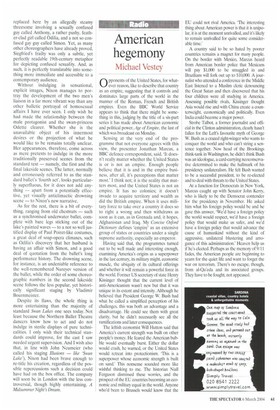American hegemony
Michael Vestey
kJpponents of the United States, for whatever reason, like to describe that country as an empire, suggesting that it controls and dominates large parts of the world in the manner of the Roman, French and British empires. Even the BBC World Service appears to think that there might be something in this, judging by the title of a six-part series it has made about American economic and political power, Age of Empire, the last of which was broadcast on Monday.
Sensing at the very end of the programme that not everyone agrees with this view, the presenter Jonathan Marcus, a BBC defence correspondent, said. 'It doesn't really matter whether the United States is or is not an empire. Enough people believe that it is and in the empire business, after all, it's perceptions that matter most.' I think not; it is the reality that matters most, and the United States is not an empire. It has no colonies; it doesn't invade to acquire territory and wealth as did the British empire. When it uses military force to take over a country it does so to right a wrong and then withdraws as soon as it can, as in Grenada and, it hopes, Afghanistan and Iraq. My Concise Word Dictionaty defines 'empire' as an extensive group of states or countries under a single supreme authority, especially an emperor.
Having said that, the programmes turned Out to be well made and interesting enough, examining America's origins as a superpower in the last century, its military might, economic muscle, the ubiquity of its cultural offerings and whether it will remain a powerful force in the world. Former US secretary of state Henry Kissinger thought that the current level of anti-Americanism wasn't new but that it was unique in its extent and intensity. Although he believed that President George W. Bush had what he called a simplified perception of his challenges, this was both an advantage and a disadvantage. He could see them with great clarity, but he didn't necessarily see all the ramifications and later consequences.
The leftish economist Will Hutton said that America's current strength was built on other people's money. He feared the American bubble would eventually burst. Either the dollar would crash, he warned, or the United States would retreat into protectionism. 'This is a superpower whose economic strength is built on sand.' This nonsense sounded more like wishful thinking to me. The historian Niall Ferguson dismissed these worries, and the prospect of the EU countries becoming an economic and military equal in the world. Anyone who'd been to Brussels would know that the EU could not rival America. 'The interesting thing about American power is that it is unipolar, it is at the moment unrivalled, and it's likely to remain unrivalled for quite some considerable time.'
A country said to be so hated by poorer countries remains a magnet for many people. On the border with Mexico, Marcus heard from American border police that Mexicans will pay $1,000 to be smuggled in and Brazilians will fork out up to $10,000. A journalist who attended a conference in the Middle East listened to a Muslim cleric denouncing the Great Satan and then discovered that his four children were all studying in America. Assessing possible rivals, Kissinger thought Asia would rise and with China create a counterweight, economically and politically. Even India could become a major power.
Strobe Talbot, a former journalist and official in the Clinton administration, clearly hasn't fallen for the Left's favourite myth of George W. Bush as a crazed right-winger who wants to conquer the world and who can't string a sentence together. Now head of the Brookings think-tank in Washington, he didn't think Bush was an ideologue, a card-carrying neoconservative determined to make the hallmark of his presidency unilateralism. He felt Bush wanted to be a successful president, to be re-elected and to deal with threats to the United States.
At a function for Democrats in New York, Marcus caught up with Senator John Kerry, who is likely to be the Democrat contender for the presidency in November. He asked him what his foreign policy would be and he gave this answer, 'We'd have a foreign policy the world would respect, we'd have a foreign policy that would make us safer, and we'd have a foreign policy that would advance the cause of humankind without the kind of aggressive, unilateral blustering and arrogance of this administration.' Heaven help us if he's elected. Perhaps as the memory of 9/11 fades, the American people are beginning to yearn for the quiet life and want to forget the war on terrorism. There's no escape, though, from al-Qa'eda and its associated groups. They have to be fought, not appeased.


















































































 Previous page
Previous page